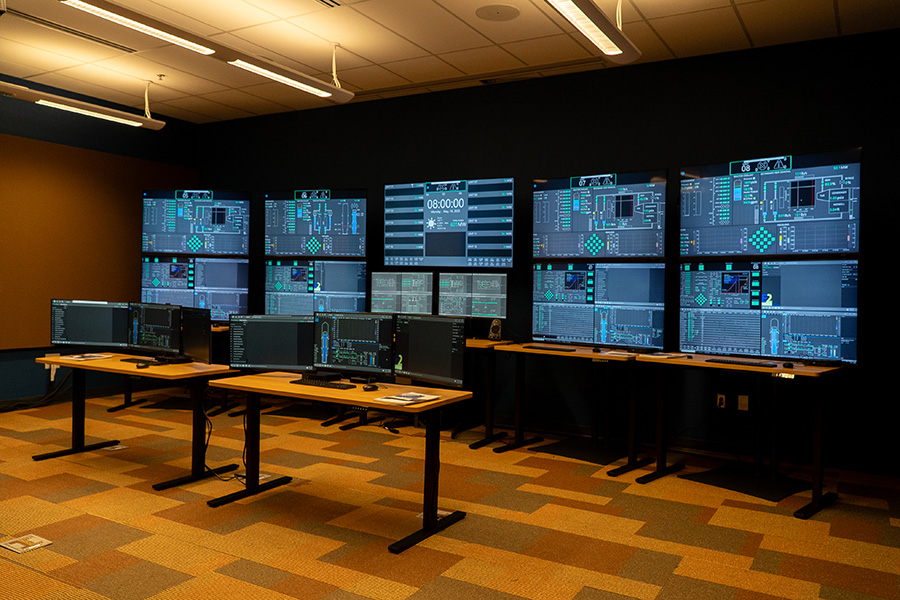Start Earning Your Nuclear Engineering Degree Today for a Bright Tomorrow
Nuclear technologies are the future, offering talented nuclear engineers endless opportunities
in a thriving industry that will see exponential growth in the coming years.
Why earn your nuclear engineer degree from South Carolina State University? South
Carolina State produces more qualified black nuclear engineers than any other nuclear
engineering degree program nationwide. That’s because we offer the only undergraduate
nuclear engineering degree in the Palmetto State and the only nuclear engineering
program at a historically black college or university (HBCU) in the country.
How much do nuclear engineers make? Determine your value starting with our mission
to educate highly skilled, well-prepared nuclear engineers ready to enter professional
careers in the public and private sectors, or to go on to prestigious graduate schools.
Our nuclear engineering degree delivers high value and clout
When you enroll at South Carolina State, you’ll have the confidence that our nuclear engineer degree program was designated one of the 25 best values in the nation in 2021 by Best Value Schools. Our nuclear engineering program is also accredited by the Engineering Accreditation Commission of the Accreditation Board for Engineering and Technology.
Method of Instruction
- Face-to-face
Nuclear Engineering Program Educational Objectives
- To educate nuclear engineers who are highly sought after and are able to contribute in nuclear and related fields.
- To educate nuclear engineers who can obtain graduate degrees.
- To train graduates who have the communication and problem solving skills to succeed as professionals in any environment (as individuals in groups or in leadership positions).
- To produce graduates who are aware of the impact of their activities as engineers in the realm of ethical, environmental, societal, legal and global concerns.
Nuclear Engineering Student Outcomes
- An ability to identify, formulate, and solve complex engineering problems by applying principles of engineering, science, and mathematics
- An ability to apply engineering design to produce solutions that meet specified needs with consideration of public health, safety, and welfare, as well as global, cultural, social, environmental, and economic factors
- An ability to communicate effectively with a range of audiences
- An ability to recognize ethical and professional responsibilities in engineering situations and make informed judgments, which must consider the impact of engineering solutions in global, economic, environmental, and societal contexts
- An ability to function effectively on a team whose members together provide leadership, create a collaborative and inclusive environment, establish goals, plan tasks, and meet objectives
- An ability to develop and conduct appropriate experimentation, analyze and interpret data, and use engineering judgment to draw conclusions
- An ability to acquire and apply new knowledge as needed, using appropriate learning strategies.
Nuclear Engineering Program Highlights
What does a nuclear engineer do? At South Carolina State, you’ll learn the answer to this important question firsthand through hands-on learning and networking opportunities. Benefits that nuclear engineer degree students enjoy at South Carolina State include:
Opportunities to put your learning into action
Nuclear engineering degree students are in high demand for industry internships. How much do nuclear engineers make? Find out while you learn.
Ample networking and career-building opportunities
Our program attracts distinguished and prominent guest nuclear engineers, including three presidents of the American Nuclear Society (ANS) and an undersecretary and deputy secretary of the U.S. Department of Energy. The ANS offers further nationwide networking opportunities.
Top-notch facilities and resources
Our program offers a state-of-the-art applied radiation sciences laboratory for hands-on study of nuclear technologies. This lab includes radiation detection instruments such as Geiger-Muller counters, Sodium Iodide detectors and High Purity Germanium detector. Also equipped in the laboratory for spectroscopic analysis is an Inductively Coupled Plasma Mass Spectrometer (ICP-MS) for trace analysis. You'll answer the question, "What does a nuclear engineer do?" in some of the best facilities here.

The NuScale Energy Exploration Center
SC State is home to one of only 10 NuScale Energy Exploration (E2) Centers in the world — and the only one in South Carolina. The E2 Center is a simulated control room that mirrors the operation of a real advanced nuclear power plant — giving students the opportunity for immersive, hands-on training in nuclear systems and plant operations.
The simulator is now fully installed and operational, allowing students in the university’s Nuclear Engineering Program to gain first-hand experience with technology used in the energy industry.
Funding to help you afford your degree
Various scholarships are available to eligible sophomores, juniors and seniors when they apply.

